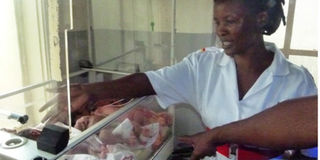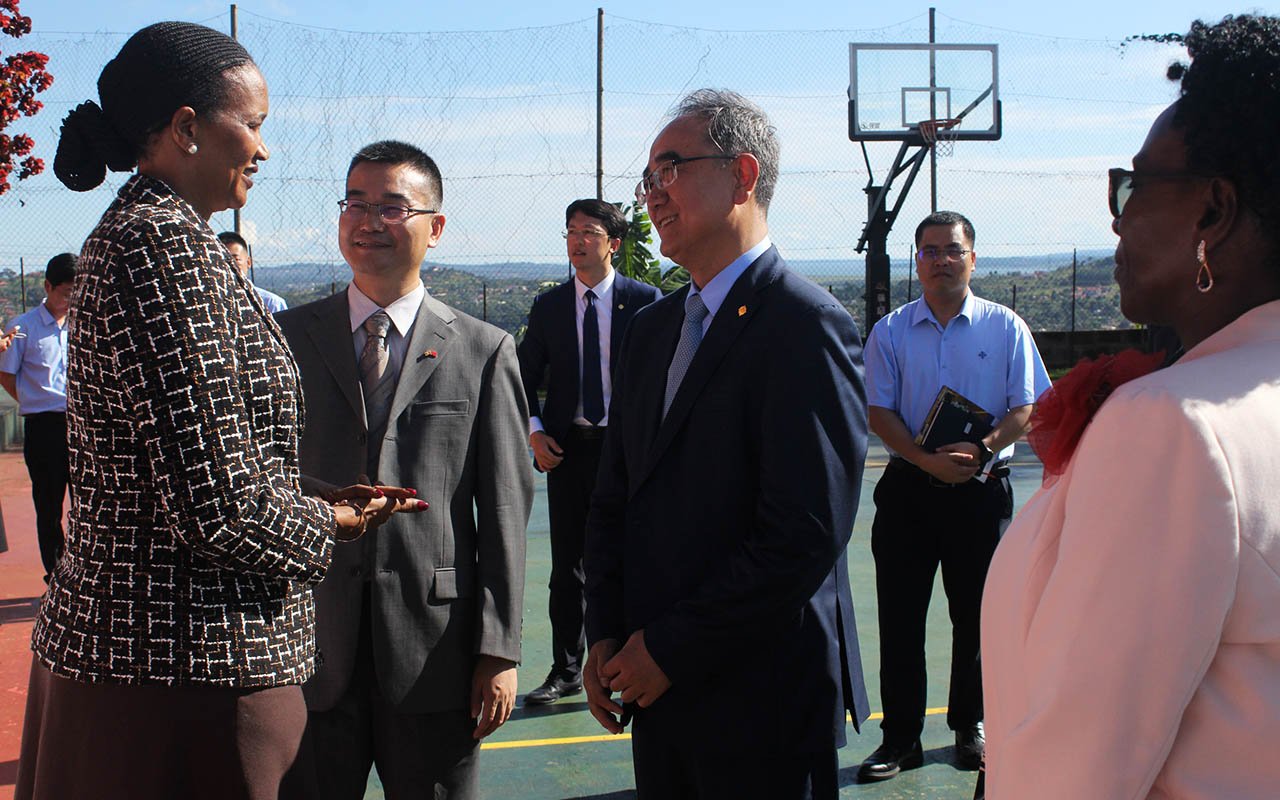Premature births: Lack of equipment worries medics

Ms Grace Bingi, the officer-in-charge of the neonatal intensive unit at Masaka Regional Referral Hospital, attends to babies in an incubator. PHOTO BY ALI MABULE
Masaka- The increasing number of premature births is worrying medics at Masaka Regional Referral Hospital.
On average, 60 premature babies are born and admitted to the neonatal intensive unit at the regional health facility monthly, according to Ms Bingi Grace, the officer in-charge of the unit.
Last month, 66 preterm babies were admitted to the unit.
Many of the babies, according to Ms Bingi require intensive medical care because of long term health complications they suffer.
She says despite the big numbers, the unit is designed to admit only eight premature babies at a time.
The World Health Organisation (WHO) defines preterm birth or a premature as a baby born before 37 weeks from the first day of the last menstrual period.
According to experts, a normal pregnancy is supposed to last for 40 weeks.
When Daily Monitor visited the facility recently, four babies were sharing an incubator meant to accommodate only one baby.
Some mothers were substituting with Kangaroo Mother Care, sometimes called skin-to-skin care, to keep their babies warm. But even with this method, the room available can only accommodate four mothers at a time.
“This is the kind of situation we experience. It is our duty to ensure that all of those mothers and their babies walk out of the hospital alive and happy,” Ms Bingi told Daily Monitor in an interview last Thursday.
However, Ms Sylvia Namutebi, who gave birth to an eight-and-half months old baby is almost losing hope.
“There are so many babies who need the service, but the equipment to save their lives is not enough. Not all of us can afford private health facilities,” a visibly scared Namutebi says.
According to Ms Bingi, they initiated the kangaroo method to avoid discharging mothers before their babies’ lives are out of danger.
“But again, we find ourselves in a situation where a mother with a pre-term baby has to be discharged on confirming that she has learnt how to regulate her baby’s warmth and can determine how much milk it needs a day,” Ms Bingi explained.
When a baby is taken to one of the only eight incubators at the unit and becomes slightly stable, it is put off oxygen and is given back to the mother to create space for others.
The mother and her baby are then sent to the general maternity ward before being discharged.
After being discharged, the patients only report back for review on appointment.
More equipment
Dr Gonzaga Ssenyondo, a senior gynecologist at the hospital, says the neonatal unit requires more four oxygen tubes to operate successfully.
“But we encourage the use of kangaroo mother care more because it fits well with our communities,” Dr Ssenyondo says.
The kangaroo mother care is more appropriate since the babies are not affected by electricity outages, according to Dr Ssenyondo.
He attributes the big number of premature births registered at Masaka hospital to the accessibility and affordability, and the big number of mothers seeking medical attention.
“Masaka hospital is the only government facility which can offer this kind of service and therefore, other health units refer all complicated deliveries to us,” he says.
Dr Ssenyondo adds that although the unit has limited equipment, it is the only hospital in the area with the skilled manpower to handle such cases.
He attributes most of the preterm cases to malaria and hypertension during pregnancy.
“Some mothers produce premature babies due to multiple pregnancies, when a mother has more than one baby in the uterus, she is likely to have an early birth,” Dr Ssenyondo says.
In Uganda, according to Dr Ssenyondo, a birth can be determined to be premature at 28 weeks and from this stage, the baby has many chances of surviving unlike in developed countries where the period lowers to 22 weeks.
Below 28 weeks, it can be regarded as a miscarriage or an abortion basing on the intention of the mother, he says.
Dr Sseyondo says there is no specific age of mothers having premature births, but it is most common among the young mothers.
He, however, urges all expectant mothers to go for antenatal checkups, take all medicines as prescribed by health personnel and report early when they are due for delivery.
“When all this is done, it enables the medial personnel to detect pre-term births,” he says.
Ms Gorrette Namugga, who gave birth to her at six months, weighing only 1.3kg, says she had sleepless nights until the baby made a year.
“It is really burdensome and costly to raise a preterm baby. When the baby survives, it is worth celebrating,” she says.
When her son made two years this month, Ms Namugga says instead of celebrating with the usual cake-cutting, she bought some items to support the neonatal unit.
“I realised it would make more sense if I joined the mothers who are undergoing the same experience,” she says, as she donated 10 hospital mattresses to the hospital neonatal unit and other gifts to the mothers with premature babies.
Both Masaka Municipality Town clerk, Paul Omoko and the Resident District Commissioner Joe Walusimbi are concerned about the situation at the unit.
“It is a big challenge to all of us and we must bring this situation to the attention of senior health officers at the mother ministry,” Mr Omoko says.
He says whereas government is spending colossal sums of money to fight malaria and other health complications, the issue of premature babies has not been given the desired attention.




